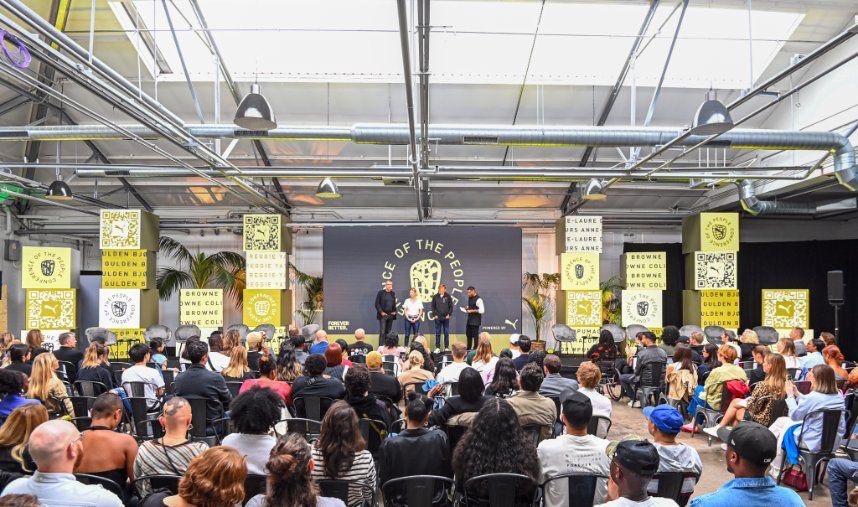Influencers have made a home for sustainability conversations on TikTok, but brands are having a harder time bringing their sustainability initiatives to the forefront. Events that focus on sustainability in an open forum, like this week’s Puma Conference of the People in London, are proving effective for engaging target audiences.
On Tuesday, Puma launched a first-of-its-kind event called the Puma COP, in the style of Glasgow’s annual UN Climate Change Conference. The event attracted Gen Zers of East London with its focus on local BIPOC creators and communities. Online viewership and participation was available through a dedicated Puma COP website.
All things sustainability were discussed in a town hall setting alongside dedicated panels from Puma and its supply chain partners. The audience was encouraged to ask tough questions and offer criticism through the app Slido, accessible via QR codes around the panel space and online. Attendee questions focused on how Puma is weighing its profits against overproduction, how it fares in Scope 3 emissions and how a short-term focus that appeases investors could hamper long-term sustainability objectives.
The underlining theme of the event was how brands can communicate directly with their audience while championing sustainability efforts. The event also brought in immersive digital experiences, sustainable product exhibits and screen-printing activations. Puma also showcased its Re:Suede sneaker, which launched via a trial in April. Forbes discovered that 62% of Generation Z prefer to purchase from sustainable brands and are willing to pay more for ethically produced goods. And while the Shein hauls are not going away, more Gen-Z consumers are focusing on asking brands tough questions before purchasing from them.
At the event, Puma CEO Bjørn Gulden said that while the brand has done well — it scored the highest on the benchmark BoF Sustainability Index, above Kering and Levi’s — it still has ways to go. “We all know we haven’t done enough. The industry has done a lot [of good] in the last few years, especially our suppliers, and we have changed. However, the only way we’re going to keep changing is by working in partnership with our competitors.”
Attendees at the event said they wanted more interactive elements and clearer information on Pum’a sustainability efforts. “If [brands] really want to engage people, then they need to do just that and make it more engaging,” attendee Rachael told Glossy. “Big brands will typically do anything to avoid getting called out. Seeing that [Puma was] willing to take criticism in front of people at their own event was quite cool.”
Puma chief sourcing officer Anne-Laure Descours said the next generation has a right to engage with brands directly. “Today is about collaboration, engagement and keeping a very positive mindset. There is a lot of goodwill, energy and ambition out there to fix what is going on [in the industry],” she said at the event.
Other brands are turning to Gen-Z employees for feedback. Italian shoe brand Golden Goose hosted its first ‘Move Forward Ideathon’ in July, where employees across its corporate and retail teams came together to brainstorm innovative ideas around sustainability.
European events like Puma’s have a direct advantage, as local brands like Stella McCartney and Marine Serre have have long focused on appealing to a younger, sustainability-focused demographic. Question-style events could become more popular as brands focus on speaking directly to their audience.
“Successful Gen-Z events are all about tapping into community — leveraging a shared connection or a unifying interest among a core group of people and translating those values creatively in real life, through experiences,” said Larry Milstein, co-founder of Gen-Z strategy and marketing firm PRZM, which has partnered on events for Soho House and Sotheby’s. He added that brands should now be looking at their Gen Z-focused events as opportunities for promoting hyper-local and social elements that bring inclusion and unique experiences together.




